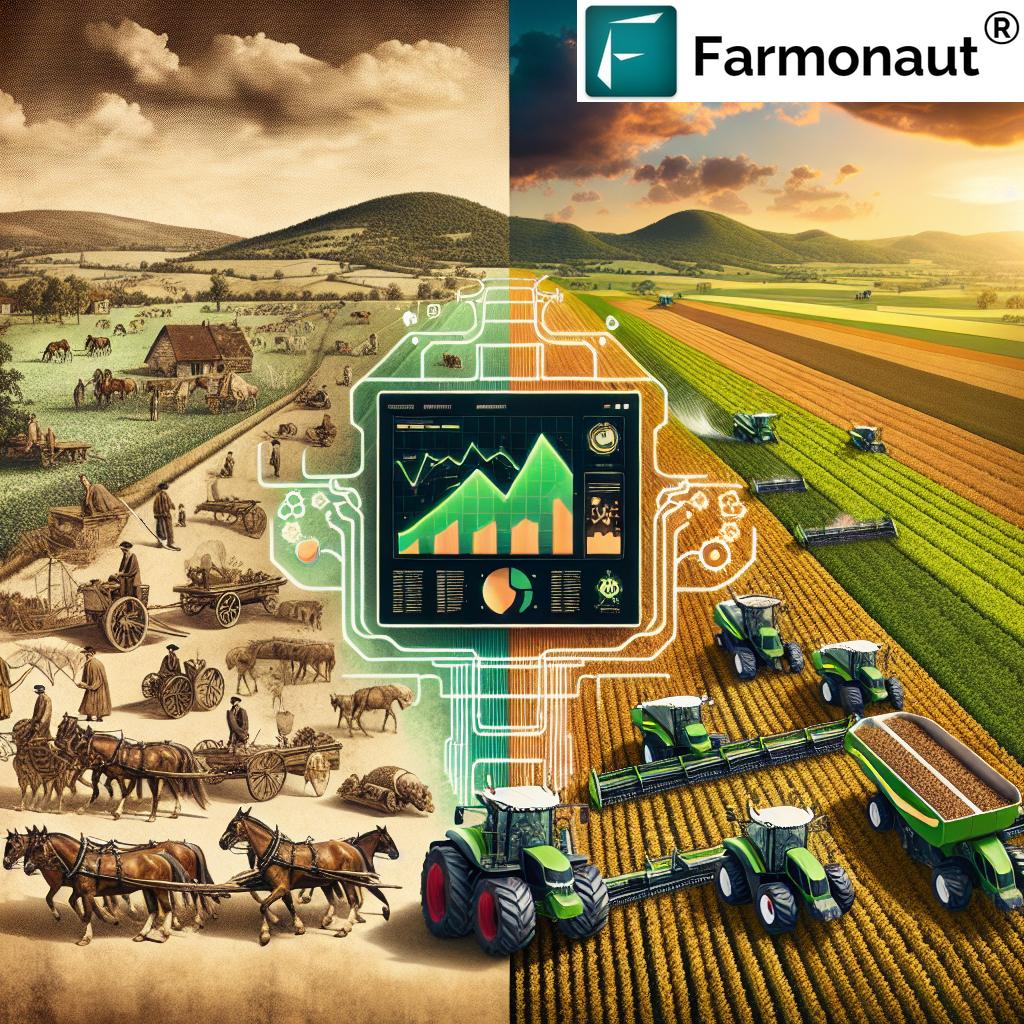Hungarian Agriculture at a Crossroads: Climate Research, Rising Costs, and Investment Trends Shaping the Future
“Hungarian farmers face rising costs, with fertilizer, seed, and supply expenses skyrocketing by an estimated 30-50% in recent years.”
As we delve into the intricate landscape of Hungarian agriculture, we find ourselves at a pivotal moment in history. The agricultural sector in Hungary is facing a complex web of challenges and opportunities, shaped by climate change, economic pressures, and technological advancements. In this comprehensive exploration, we’ll examine how these factors are influencing food production, market dynamics, and the future of farming in this Central European nation.
Climate Change Research: Unveiling Ancient Secrets for Modern Agriculture
Recent scientific breakthroughs have shed new light on the potential impacts of climate change on Hungarian agriculture. A groundbreaking study focusing on Earth’s climatic patterns from 34 million years ago has provided invaluable insights that could shape the future of farming in the region.
“A groundbreaking study on Earth’s climate 34 million years ago provides insights for modern Hungarian agriculture, potentially impacting 5.3 million hectares of farmland.”
This research, conducted by an international team of scientists, has revealed fascinating parallels between ancient climate shifts and current trends. By studying sediment cores from the Antarctic Ocean, researchers have uncovered evidence of dramatic changes in ocean circulation and temperature patterns that occurred during a period known as the Eocene-Oligocene boundary.
- Increased understanding of long-term climate cycles
- Potential for more accurate climate prediction models
- Implications for crop selection and adaptation strategies
For Hungarian farmers, this research offers a unique perspective on how to prepare for and adapt to changing climatic conditions. By understanding the mechanisms that drove ancient climate shifts, we can better anticipate the challenges that lie ahead for agriculture in the region.
Rising Costs: The Economic Squeeze on Hungarian Farmers
While climate research provides valuable insights, Hungarian farmers are grappling with more immediate concerns. The rising costs of agricultural inputs have placed significant pressure on producers across the country.
- Fertilizer prices have surged, impacting crop yields and profitability
- Seed costs continue to climb, affecting planting decisions
- Agricultural supplies and equipment expenses are straining farm budgets
These escalating costs are forcing farmers to reevaluate their production strategies and seek innovative solutions to maintain profitability. Many are turning to precision agriculture techniques and sustainable farming practices to optimize resource use and reduce input costs.
Agro Business Investments: A Silver Lining for Hungarian Agriculture
Despite the challenges posed by climate change and rising costs, there’s a promising trend emerging in the Hungarian agricultural sector. Agro business investments are on the rise, with many companies recognizing the potential for growth and innovation in this vital industry.
- Increasing capital inflow into agricultural technology
- Growing interest in precision agriculture solutions
- Investments in water management and soil health optimization
These investments are not only boosting the agricultural sector’s economic prospects but also driving the adoption of cutting-edge technologies that can help address some of the most pressing challenges facing Hungarian farmers.

Precision Agriculture: The Future of Farming in Hungary
As we navigate the complexities of modern agriculture, precision farming techniques are emerging as a crucial tool for Hungarian farmers. These advanced technologies offer the potential to optimize resource use, increase yields, and reduce environmental impact.
One company at the forefront of this revolution is Farmonaut, a pioneering agricultural technology provider offering advanced, satellite-based farm management solutions. Through its android, iOS, and web applications, as well as API integration, Farmonaut is making precision agriculture more accessible and affordable for farmers across Hungary and beyond.
Key features of precision agriculture solutions:
- Satellite-based crop health monitoring
- AI-driven advisory systems for personalized farm management
- Real-time weather forecasting and analysis
- Soil health optimization tools
- Resource management and allocation systems
By leveraging these advanced technologies, Hungarian farmers can make more informed decisions about irrigation, fertilizer application, and pest management, ultimately leading to improved crop yields and reduced waste.
Explore Farmonaut’s precision agriculture solutions:
Water Management: A Critical Focus for Hungarian Agriculture
As climate patterns shift and water resources become increasingly scarce, effective water management has become a top priority for Hungarian farmers. The agricultural sector is investing heavily in innovative irrigation systems and water conservation techniques to ensure sustainable crop production in the face of changing environmental conditions.
- Implementation of drip irrigation systems for water efficiency
- Adoption of drought-resistant crop varieties
- Development of water harvesting and storage solutions
- Use of soil moisture sensors for precision irrigation
These water management strategies are not only helping farmers adapt to climate change but also contributing to the overall sustainability of Hungarian agriculture.
Soil Health: The Foundation of Sustainable Agriculture
Recognizing the vital role of soil health in agricultural productivity, Hungarian farmers and researchers are placing increased emphasis on soil conservation and improvement techniques. Healthy soils not only support better crop yields but also contribute to carbon sequestration, playing a crucial role in mitigating climate change impacts.
- Implementation of crop rotation and cover cropping practices
- Reduced tillage and no-till farming techniques
- Application of organic amendments to improve soil structure
- Use of precision soil testing and nutrient management
By focusing on soil health, Hungarian farmers are laying the groundwork for a more resilient and sustainable agricultural sector.
Labor Market Challenges: The Hunt for Skilled Agricultural Workers
Despite the technological advancements and investment trends, the Hungarian agricultural sector faces a significant challenge in finding and retaining skilled workers. The labor shortage is putting pressure on farms of all sizes and could potentially limit the sector’s growth and innovation potential.
- Aging farming population and lack of young entrants to the sector
- Competition from other industries for skilled workers
- Need for specialized training in modern agricultural technologies
- Challenges in attracting workers to rural areas
Addressing these labor market challenges will be crucial for ensuring the long-term viability and competitiveness of Hungarian agriculture.

The Role of Technology in Addressing Agricultural Challenges
As we navigate the complexities of modern agriculture in Hungary, technology emerges as a powerful tool for addressing many of the sector’s most pressing challenges. From satellite-based crop monitoring to AI-driven advisory systems, innovative solutions are helping farmers optimize their operations and adapt to changing conditions.
Farmonaut’s suite of agricultural technology solutions exemplifies this trend, offering Hungarian farmers access to cutting-edge tools for precision agriculture, resource management, and sustainable farming practices. By leveraging satellite imagery, artificial intelligence, and machine learning, Farmonaut is empowering farmers to make data-driven decisions that can improve yields, reduce costs, and minimize environmental impact.
Key technological advancements in Hungarian agriculture:
- Satellite-based crop health monitoring for early detection of issues
- AI-powered advisory systems for personalized farm management
- Blockchain-based traceability solutions for supply chain transparency
- Precision agriculture tools for optimized resource allocation
- Remote sensing technologies for large-scale crop monitoring
These technological solutions are not only helping individual farmers improve their operations but are also contributing to the overall resilience and sustainability of the Hungarian agricultural sector.
Explore Farmonaut’s API for custom agricultural solutions:
The Future of Hungarian Agriculture: Balancing Challenges and Opportunities
As we look to the future of Hungarian agriculture, it’s clear that the sector stands at a critical juncture. The challenges posed by climate change, rising input costs, and labor shortages are significant, but so too are the opportunities presented by technological innovation and increased investment in the sector.
To thrive in this dynamic environment, Hungarian farmers and agribusinesses will need to embrace a holistic approach that combines:
- Adoption of precision agriculture techniques for optimized resource use
- Implementation of sustainable farming practices to improve resilience
- Investment in water management and soil health solutions
- Leveraging of technology for data-driven decision-making
- Development of strategies to attract and retain skilled agricultural workers
By focusing on these key areas, the Hungarian agricultural sector can position itself for long-term success, ensuring food security, economic prosperity, and environmental sustainability for generations to come.
Hungarian Agriculture Trends Comparison
| Time Period | Climate Impact (1-10) | Input Costs (€/ha) | Investment in Precision Agriculture (€ millions) | Water Management Efficiency (%) | Soil Health Index (1-100) | Revenue Growth (%) | Labor Shortage (1-10) |
|---|---|---|---|---|---|---|---|
| Past (5 years ago) | 5 | 500 | 20 | 60 | 70 | 2 | 6 |
| Present | 7 | 750 | 50 | 75 | 75 | 3 | 8 |
| Future (projected 5 years) | 8 | 900 | 100 | 85 | 80 | 4 | 7 |
Conclusion: Embracing Innovation for a Sustainable Future
As we’ve explored throughout this article, Hungarian agriculture is indeed at a crossroads. The sector faces significant challenges, from the impacts of climate change to rising input costs and labor shortages. However, it also stands on the brink of a technological revolution that could transform farming practices and drive sustainable growth.
By embracing precision agriculture solutions, investing in water management and soil health, and leveraging cutting-edge technologies like those offered by Farmonaut, Hungarian farmers and agribusinesses can navigate these challenges and emerge stronger. The future of agriculture in Hungary will be shaped by those who can adapt to changing conditions, harness the power of data-driven insights, and commit to sustainable farming practices.
As we move forward, it’s clear that collaboration between farmers, researchers, technology providers, and policymakers will be crucial in building a resilient and prosperous agricultural sector. By working together and embracing innovation, we can ensure that Hungarian agriculture not only survives but thrives in the face of global challenges.
FAQ: Hungarian Agriculture at a Crossroads
Q1: How is climate change affecting Hungarian agriculture?
A1: Climate change is impacting Hungarian agriculture through increased temperature variability, more frequent extreme weather events, and changes in precipitation patterns. These factors are affecting crop yields, growing seasons, and water availability, necessitating adaptive strategies from farmers.
Q2: What are the main challenges facing Hungarian farmers today?
A2: Hungarian farmers are grappling with rising input costs (such as fertilizers and seeds), labor shortages, the need to adapt to climate change, and the pressure to adopt new technologies for precision agriculture.
Q3: How is technology helping to address agricultural challenges in Hungary?
A3: Technology is playing a crucial role through precision agriculture solutions, satellite-based crop monitoring, AI-driven advisory systems, and advanced water management tools. These technologies help farmers optimize resource use, improve yields, and adapt to changing conditions.
Q4: What investments are being made in Hungarian agriculture?
A4: Investments are increasing in areas such as precision agriculture technologies, water management systems, soil health improvement, and sustainable farming practices. Both private companies and government initiatives are contributing to these investments.
Q5: How can Hungarian agriculture become more sustainable?
A5: Sustainability in Hungarian agriculture can be achieved through the adoption of precision farming techniques, improved water management, soil health optimization, crop diversification, and the use of renewable energy sources in farm operations.






